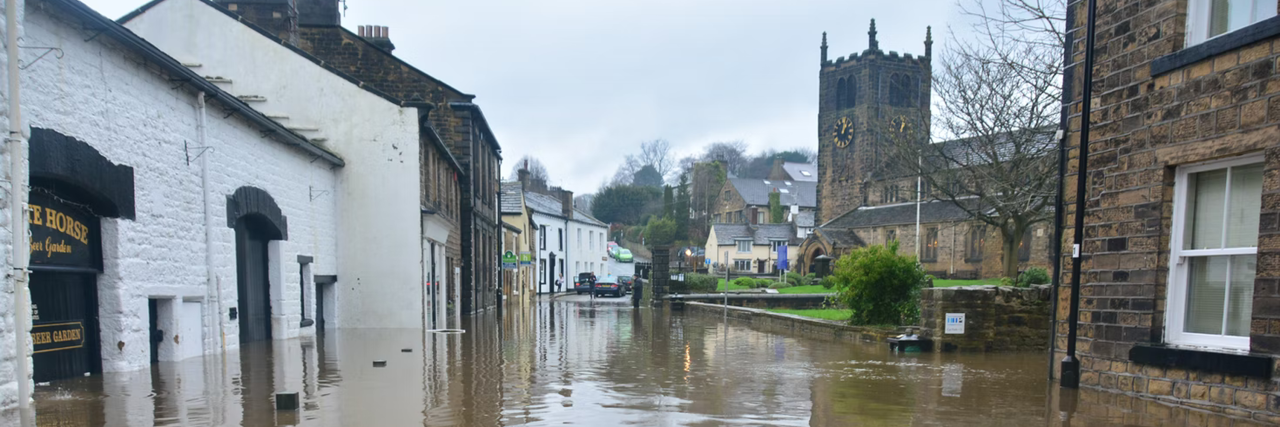Green Finance
How is extreme weather impacting SMEs and what can they do to prepare?
18 Mar 2022
In February, a polar vortex unleashed a trio of deadly storms — Dudley, Eunice and Franklin — on the UK and Western Europe, with heavy winds causing widespread damage across the region. According to the experts, we can expect more storms like these. So what can business owners do to prepare for the rise in extreme weather, and what steps can UK medium and small businesses take to reduce their carbon footprint, remain environmentally friendly and play their part in the global race to net-zero?

Of the three mentioned above, Storm Eunice was the most powerful, taking hold in the early hours of 18 February and sending winds of more than 120mph crashing into the UK.
The severity of the three storms' unleashed winds was caused by a 'sting-jet': a narrow airstream forming inside each storm.
Despite Eunice having run its course, a recent met office study has revealed that the UK can expect similar storms with a 'sting jet' in their tails, as climate change further fuels the conditions necessary for these 'perfect storms' to form.
In February, Michael Dukes, a forecaster at MetDesk, told the Guardian that storm Eunice could be linked to climate change.
He said: "Although it is hard to pinpoint climate change as a reason for individual severe weather events, climate models indicate an increase in these storms as the earth continues to slowly warm."
What does extreme weather mean for businesses?
As the effects of climate change continue to be felt, the UK can expect — with increasing frequency — more extreme weather. Storms like Eunice could cause medium and small businesses thousands of pounds worth of damage a year.
Consequently, the better-prepared business owners are, the better they can mitigate any possible losses and continue to trade with minimal disruption.
When it comes to disruptive weather, the impact on your business will depend on its location, business model, investments in green and the resiliency of your premises. For instance, extreme weather can affect remote businesses through supply chain disruption.
Here are 5 things you can do to prepare:
1. Keep a close eye on your premises
Conduct a visual inspection of your premises. Check that the windows and doors, roof and guttering are all in good condition (if you rent your premises, you may want to ask your landlord for an assessment).
Should you notice anything, get in touch with a local tradesperson. To give you enough time to sort out any potential problems, it could be helpful to do periodic checks since you're unlikely to get much notice if severe weather is coming.
If anything is kept outside, such as tables and chairs, signs and awnings, think about investing in a secure unit or shed. Keeping them in a safe place could minimise the risk of them being damaged in another disruptive storm.
2. Have a flood plan
Flood damage currently costs businesses around £1.3 billion in the UK, so your continuity strategy should include a flood plain. It's vital that you understand the flood risk in your area first and foremost by signing up for local flood warnings.
If you're at risk of flooding, prepare by researching flood-resistant property upgrades, moving essential business equipment to a higher floor and regularly backing up data and files.
3. Protect against supply chain disruption
Whether or not extreme weather events impact your business, your supply chain could be affected.
Consider how you can make your supply chain more efficient and resilient to disruption. You might be able to extend your business interruption insurance to cover you if one of your vendors is impacted by a storm or flood.
Do you have an alternative supplier you could turn to in an emergency?
4. Safeguard your water and energy
Extreme weather conditions can wreak havoc with a business' power, water and telecommunications technology. You can protect your business by investing in on-site power-generating infrastructure, such as solar panels.
If your business relies on water, consider what would happen if water restrictions came into play. Could you make processes less water-intensive or install a rain collection system?

Credit: Bill Mead
5. Increasing future workability
Extreme heat impacts people's ability to work and could lead to health and safety issues. In 2019, a heatwave spread across continental Europe and some businesses, including restaurants, had to close temporarily.
As the world heats up, businesses must think about how they will maintain safe and comfortable working conditions. Green or cool roofs and efficient environmentally friendly air conditioning systems can make a huge difference in employee well-being and productivity.
How can I ensure my business is environmentally friendly?
Ultimately, the only way we can protect our businesses and communities in the long term is by cutting our carbon emissions to curb climate change.
Every business, large or small, should do what it can to reduce or offset its carbon emissions and decrease its carbon footprint. If every organisation plays its part, we can meet the Paris Agreement target of limiting global warming to 1.5°C, compared to pre-industrial levels.
According to the Climate Change Committee, "keeping below 1.5°C would limit many important risks further, helping to protect key ecosystems and reducing impacts on poorer people around the world."
Companies large and small are finding that 'going green' benefits their bottom line. Increasing operational efficiency can drive down production costs, saving you money and enabling you to invest in growth.
Having a net-zero strategy can also put you at a competitive advantage by enhancing your repetition in the eyes of customers and other stakeholders. It future-proofs you by helping you prepare for future greenhouse gas regulations.
Here are 7 things to put on your net-zero to-do list:
Recycle paper, plastic and other materials
Reduce waste or manage it more effectively to limit what goes to landfill
Consider developing environmentally friendly products and services
Commit to net zero and inform/train your staff, customers and suppliers
Switch to renewable energy, such as investing in a solar panel to generate electricity
Cut driving or switch to electric company vehicles; encourage staff to cycle by providing bike storage and show facilities
Cut your supply chain emissions by opting for greener, local suppliers
Apply for sustainable finance today
Are you ready to start your climate resiliency journey?
At Funding Options, we've created a Green Finance Marketplace to help SMEs obtain a green loan and fund their journey towards reaching net zero. Whether you're looking to launch a more sustainable product line or want to invest in green assets, see what you could be eligible for today.
Get green financeSubscribe to our newsletter today
Sign up for the best of Funding Options sent straight to your inbox.
